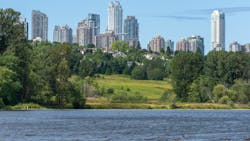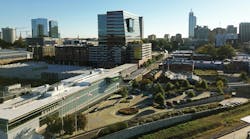31 major cities sign global urban greenspace commitment
31 of the world’s great cities will be significantly greener in the years ahead, as leading mayors have committed to further expand, restore and protect urban green spaces within their cities through the C40 Urban Nature Declaration.
Through this Declaraion, the cities will make investments in nature that will speed up existing efforts to make communities healthier, improve air quality and help protect cities from the increasingly severe impacts of the climate crisis, such as extreme heat, flooding and drought.
The targets set by cities signing the C40 Urban Nature Declaration will mean huge increases in public green and blue spaces.
Work has already begun in several cities: Durban began work to complete a Transformative Riverine Management Program to improve the city’s rivers, which will improve resilience and create thousands of green jobs; Barcelona will subsidize 75% of the cost of new green rooftops, creating urban allotments and providing space for renewable energy generation, rainwater collection and composting for organic waste.
In Guadalajara, 67,000 new trees will be planted across 70 green corridors, and over 50 new public gardens will be introduced to cool down the city and provide shade and leisure space. The city is funding courses to train gardeners and tree technicians, and providing 400 workshops for residents on caring for trees and gardens.
Under Toronto’s Urban Forests Grants and Incentives program, over 13,000 trees and shrubs will be planted, educating and engaging communities through planting events, educational workshops and youth programming. In Mumbai, the Maharashtra government is making amendments to the ‘Tree Act’ to protect and conserve old trees and prevent felling of trees, whilst protecting even more mangrove trees than the 9,800 hectares given the status of ‘Reserved Forest’ in just the last year.
These actions are part of C40 mayors’ continued efforts to deliver a green and just recovery from COVID-19.
Cities signing C40’s Urban Nature declaration are addressing heat- and water-related risk, ensuring that by 2030, 30-40% of total built-up city surface area will consist of green spaces such as street trees, urban forests and parks; or permeable spaces such as sustainable urban drainage systems and pavements designed to absorb water and prevent flooding. Cities will also focus on promoting accessibility and connectivity for vulnerable communities, ensuring that 70% of the city population has access to green or blue public spaces within a 15-minute walk or bike ride by 2030.
Researchers in Portland, Oregon found the city’s urban trees cut nitrogen dioxide levels resulting in significantly fewer respiratory problems, valued at $7 million in health care savings annually. In Durban, 300 green jobs were created with the ecosystem restoration of 3,000 hectares, and in Buenos Aires, the regenerated Lago Lugano nature reserve, formerly the site of a landfill, is now home to over 200 plant species and 99 bird species. It is a natural reservoir to mitigate flood risk and has created jobs and an educational centre for visiting school groups.
“Supporting and protecting cities’ natural ecosystems is one of our most important tools for building resiliency against the climate crisis and creating the healthy, inclusive urban communities we deserve,” said Mark Watts, C40 Cities Executive Director. “Throughout the COVID-19 pandemic, we were reminded that accessible, green spaces are essential for livable, climate ready and crisis prepared cities. As we seek to deliver a green and just recovery, investing in and implementing nature-based climate solutions will be imperative to public health and well-being, as well as the success of global efforts to tackle the climate crisis. The C40 Urban Nature Declaration is yet another example of city leaders acting now to secure the transformations needed for a better future.”
SOURCE: C40 Cities


